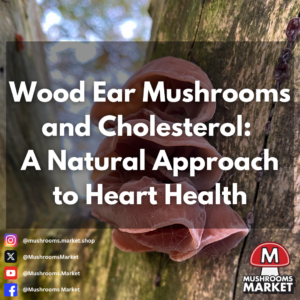
Wood Ear Mushrooms and Cholesterol: A Natural Approach to Heart Health
Wood Ear mushrooms (Auricularia auricula-judae), known for their crunchy texture and subtle flavor, are more than just a staple in Asian cuisine—they might also be
Mushrooms have been a staple in many culinary traditions for centuries, known for their unique flavors and textures. However, their appeal extends beyond the palate. Recent research has highlighted the potential benefits of mushrooms for heart health, making them a valuable addition to a heart-conscious diet.
One of the key reasons mushrooms are heart-healthy is their low-calorie and low-fat content. They make an excellent choice for those aiming to maintain a healthy weight, a crucial factor in reducing the risk of heart disease. This attribute allows you to enjoy the satisfying umami flavor of mushrooms without worrying about excess calories or unhealthy fats.
Mushrooms are packed with antioxidants, including selenium and ergothioneine. Antioxidants help combat oxidative stress and inflammation, both of which are linked to heart disease. Selenium, in particular, is a powerful ally in this regard, as it helps protect your cells from damage caused by free radicals.
Mushrooms contain dietary fiber, which is essential for digestive health. Fiber plays a crucial role in reducing cholesterol levels, a known risk factor for heart disease. It does this by binding to cholesterol in the digestive tract, helping to prevent its absorption into the bloodstream. This cholesterol-lowering effect can contribute to better heart health over time.
Potassium is a mineral known to help regulate blood pressure. Maintaining healthy blood pressure levels is vital for heart health, and mushrooms provide a modest but beneficial dose of potassium. While they may not be as potassium-rich as some other foods like bananas, every bit helps in supporting cardiovascular well-being.
Some mushroom varieties, such as shiitake and maitake, contain beta-glucans. These compounds have been associated with lower LDL cholesterol levels, often referred to as “bad” cholesterol. Beta-glucans work by inhibiting the absorption of dietary cholesterol in the gut and promoting its excretion. Including beta-glucan-rich mushrooms in your diet can contribute to better cholesterol management.
Mushrooms exposed to sunlight or UV light during growth can naturally produce vitamin D. This essential vitamin contributes to overall health and may indirectly support heart health by maintaining bone health. Adequate vitamin D levels are associated with a reduced risk of heart disease, so adding mushrooms to your diet can be a tasty way to boost your intake.
Chronic inflammation is a contributing factor to heart disease. The antioxidants and anti-inflammatory properties in mushrooms may help reduce inflammation and its adverse effects on cardiovascular health. Lowering inflammation levels can improve the health of your blood vessels and reduce the risk of plaque buildup in your arteries.
One of the advantages of mushrooms is their versatility in the kitchen. You can incorporate them into a wide range of dishes, from stir-fries to salads and soups, making it easy to include them in your diet regularly. Whether you prefer the earthy flavor of portobello mushrooms or the delicate taste of oyster mushrooms, there’s a mushroom variety to suit every culinary preference.
If you’re not a fan of mushrooms or have dietary restrictions, mushroom supplements are available. These supplements provide a concentrated dose of mushroom extracts, making it convenient to enjoy the potential heart benefits of mushrooms. When choosing a supplement, look for one that contains a variety of mushroom species to maximize the potential health benefits.
Now that you’re aware of the heart-healthy benefits of mushrooms, it’s time to explore creative ways to include them in your meals. Try sautéing mushrooms with garlic and herbs for a flavorful side dish, adding them to omelets or frittatas, or using them as a meat substitute in burgers or pasta dishes. Mushroom soup, grilled mushrooms, and stuffed mushrooms are other delicious options to consider.
While mushrooms offer several advantages for heart health, it’s important to remember that they are just one component of a heart-healthy diet. A well-rounded approach to cardiovascular wellness includes a variety of nutrient-rich foods, such as fruits, vegetables, whole grains, lean proteins, and healthy fats. Reducing your intake of processed foods, sugary beverages, and excessive sodium is also essential.
Before making significant dietary changes, especially if you have specific heart health concerns or medical conditions, consult with a healthcare professional or registered dietitian. They can provide personalized recommendations tailored to your individual needs and help you create a diet plan that supports your heart health goals.
In conclusion, while mushrooms may not be a magic bullet for heart health, they are a delicious and nutritious addition to your diet that can contribute to overall well-being. Incorporating a variety of mushrooms into your meals and maintaining a balanced diet is a proactive step toward supporting your cardiovascular health. As always, consult with a healthcare professional for personalized dietary recommendations and guidance on your journey to a healthier heart.

Wood Ear mushrooms (Auricularia auricula-judae), known for their crunchy texture and subtle flavor, are more than just a staple in Asian cuisine—they might also be

In recent years, wellness seekers and holistic health enthusiasts have turned their attention to the forest floor—not for herbs or roots, but for medicinal mushrooms.

In the growing search for natural, plant-based medicines, few fungi stand out as strongly as Agarikon (Fomitopsis officinalis). Known as a rare and ancient medicinal
FDA Disclaimer: These products have not been evaluated by the Food and Drug Administration and are not intended to diagnose, treat, cure or prevent any disease.
© 2025 Mushrooms Market - All Rights Reserved